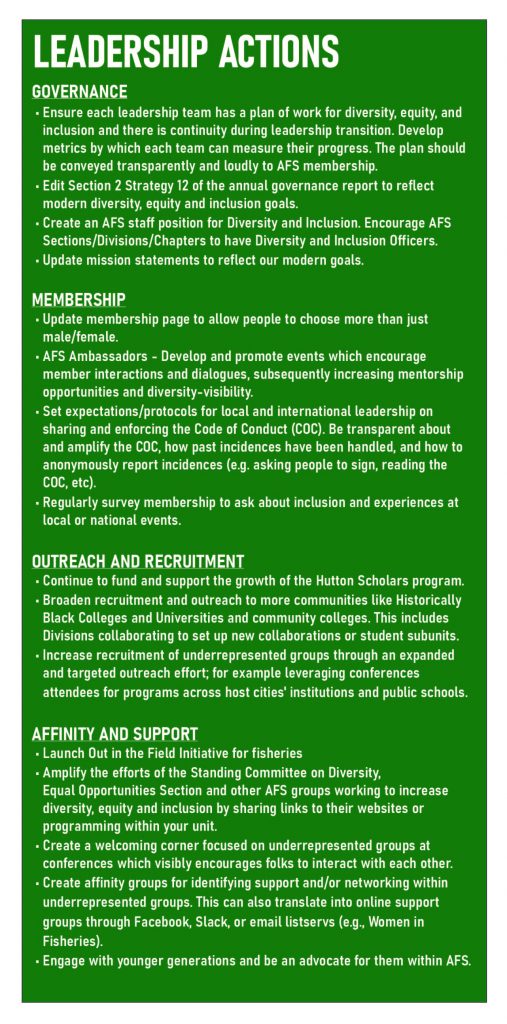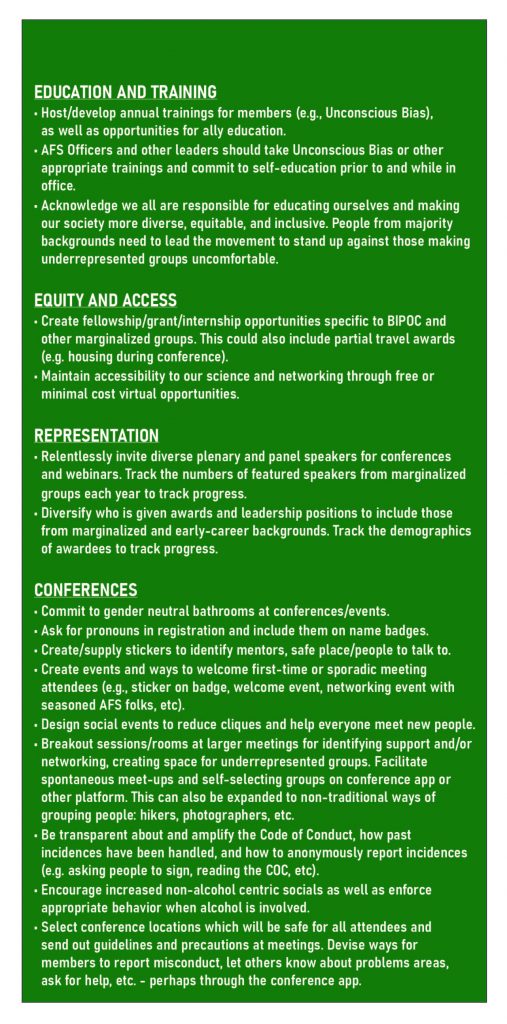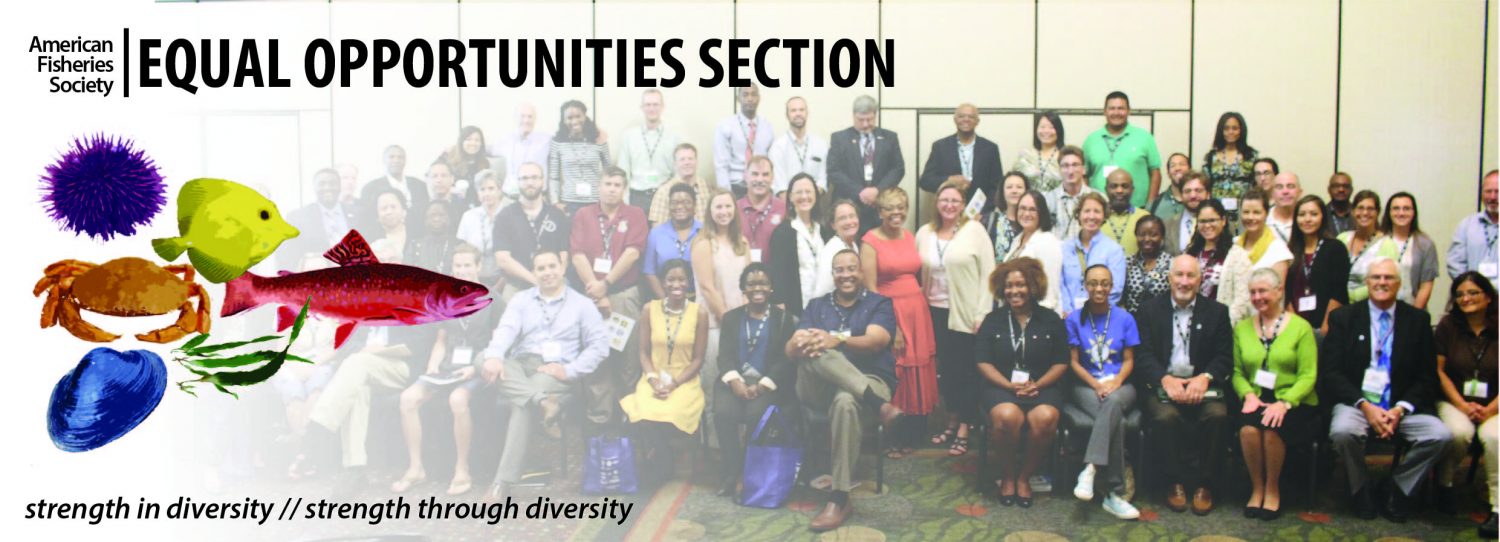Leadership Actions
Leadership Actions
From the DI Day breakout sessions and inclusivity survey, we have created lists of action items that can be taken by leaders within AFS. Check out the EOS site for more information and to download a template your unit, section, subsection, or division can use to outline your own action plans and timelines.
Governance
- Ensure each leadership team has a plan of work for diversity, equity, and inclusion and there is continuity during leadership transition. Develop metrics by which each team can measure their progress. The plan should be conveyed transparently and loudly to AFS membership.
- Edit Section 2 Strategy 12 of the annual governance report to reflect modern diversity, equity and inclusion goals.
- Create an AFS staff position for Diversity and Inclusion. Encourage AFS Sections/Divisions/Chapters to have Diversity and Inclusion Officers.
- Update mission statements to reflect our modern goals.
Membership
- Update membership page to allow people to choose more than just male/female.
- AFS Ambassadors – Develop and promote events which encourage member interactions and dialogues, subsequently increasing mentorship opportunities and diversity-visibility.
- Set expectations/protocols for local and international leadership on sharing and enforcing the Code of Conduct (COC). Be transparent about and amplify the COC, how past incidences have been handled, and how to anonymously report incidences (e.g. asking people to sign, reading the COC, etc).
- Regularly survey membership to ask about inclusion and experiences at local or national events.
Outreach and Recruitment
- Continue to fund and support the growth of the Hutton Scholars program.
- Broaden recruitment and outreach to more communities like Historically Black Colleges and Universities and community colleges. This includes Divisions collaborating to set up new collaborations or student subunits.
- Increase recruitment of underrepresented groups through an expanded and targeted outreach effort; for example leveraging conferences attendees for programs across host cities' institutions and public schools.
Affinity and Support
- Launch Out in the Field Initiative for fisheries
- Amplify the efforts of the Standing Committee on Diversity, Equal Opportunities Section and other AFS groups working to increase diversity, equity and inclusion by sharing links to their websites or programming within your unit.
- Create a welcoming corner focused on underrepresented groups at conferences which visibly encourages folks to interact with each other.
- Create affinity groups for identifying support and/or networking within underrepresented groups. This can also translate into online support groups through Facebook, Slack, or email listservs (e.g., Women in Fisheries).
- Engage with younger generations and be an advocate for them within AFS.
Education and Training
- Host/develop annual trainings for members (e.g., Unconscious Bias), as well as opportunities for ally education.
- AFS Officers and other leaders should take Unconscious Bias or other appropriate trainings and commit to self-education prior to and while in office.
- Acknowledge we all are responsible for educating ourselves and making our society more diverse, equitable, and inclusive. People from majority backgrounds need to lead the movement to stand up against those making underrepresented groups uncomfortable.
Equity and Access
- Create fellowship/grant/internship opportunities specific to BIPOC and other marginalized groups. This could also include partial travel awards (e.g. housing during conference).
- Maintain accessibility to our science and networking through free or minimal cost virtual opportunities.
Representation
- Relentlessly invite diverse plenary and panel speakers for conferences and webinars. Track the numbers of featured speakers from marginalized groups each year to track progress.
- Diversify who is given awards and leadership positions to include those from marginalized and early-career backgrounds. Track the demographics of awardees to track progress.
Conferences
- Commit to gender neutral bathrooms at conferences/events.
- Ask for pronouns in registration and include them on name badges.
- Create/supply stickers to identify mentors, safe place/people to talk to.
- Create events and ways to welcome first-time or sporadic meeting attendees (e.g., sticker on badge, welcome event, networking event with seasoned AFS folks, etc).
- Design social events to reduce cliques and help everyone meet new people.
- Breakout sessions/rooms at larger meetings for identifying support and/or networking, creating space for underrepresented groups. Facilitate spontaneous meet-ups and self-selecting groups on conference app or other platform. This can also be expanded to non-traditional ways of grouping people: hikers, photographers, etc.
- Be transparent about and amplify the Code of Conduct, how past incidences have been handled, and how to anonymously report incidences (e.g. asking people to sign, reading the COC, etc).
- Encourage increased non-alcohol centric socials as well as enforce appropriate behavior when alcohol is involved.
- Select conference locations which will be safe for all attendees and send out guidelines and precautions at meetings. Devise ways for members to report misconduct, let others know about problems areas, ask for help, etc. – perhaps through the conference app.
Use this .jpeg to for printing a copy of these action items:


